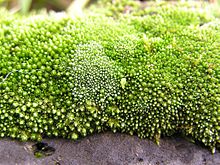bryophyte
Appearance
English
[edit]


Etymology
[edit]From Bryophyta, from Ancient Greek βρύον (brúon, “moss”) + φυτόν (phutón, “plant”) ( + -phyte).
Pronunciation
[edit]Noun
[edit]bryophyte (plural bryophytes)
- (botany) Any plant of the division Bryophyta, defined sensu lato to comprise the mosses, liverworts and hornworts and corresponding to all embryophytes that are not vascular plants.
- 1993, Wilson Nichols Stewart, Paleobotany and the Evolution of Plants[1], page 77:
- Without going into their reasons, Bold, Alexopoulos, & DelBevoryas (1980) and Crandall-Stotler (1980) believe that there are at least three independent lines of bryophytes and that this is best reflected by establishing three divisions - the Bryophyta (mosses), Hepatophyta (liverworts), and Anthocerotophyta (hornworts).
- 2002, William R. Buck, Bryophytes, entry in Niles Eldredge (editor), Life on Earth, page 202,
- Because of their small size and often delicate structure, bryophytes have a poor fossil record, dating back only about 290 million years.
- 2003, Bill Bryson, A Short History of Nearly Everything, BCA, published 2003, page 312:
- And so it was that I was introduced to Len Ellis and the quiet world of bryophytes – mosses to the rest of us.
Derived terms
[edit]Translations
[edit]member of the Bryophyta; moss, liverwort, or hornwort
|
See also
[edit]- Anthocerotophyta (the hornworts)
- cryptogam
- embryophyte
- Marchantiophyta (the liverworts)
- pteridophyte
- spermatophyte
French
[edit]Noun
[edit]bryophyte m (plural bryophytes)
Categories:
- English terms derived from Ancient Greek
- English terms suffixed with -phyte
- English 3-syllable words
- English terms with IPA pronunciation
- English lemmas
- English nouns
- English countable nouns
- en:Botany
- English terms with quotations
- en:Mosses
- en:Spore plants
- French lemmas
- French nouns
- French countable nouns
- French masculine nouns

